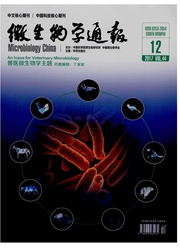

 中文摘要:
中文摘要:
在分子生物技术中,筛选标记基因是遗传转化载体所必备的基本元件之一,其主要功能是在基因操作中进行目标克隆的筛选,以及在应用过程中通过选择压力维持基因重组性状。抗药基因是微生物遗传转化中常用的筛选标记,大肠杆菌载体和一般穿梭载体中通常带有抗药基因。带有抗药基因的工程菌可以被广泛地应用于酶和有机化学品的发酵生产,因为工业发酵过程是在封闭系统中进行的,并且最终产品需要经过提炼。但是当人们需要用基因改良的菌株进行食品和饲料加工、环境修复、病虫害生物防治时,抗药基因类筛选标记应该被禁止使用。因此,发展生物安全性筛选标记成为遗传转化技术推广应用中的一个技术关键。本文介绍常用作筛选标记的抗药基因,以及针对抗药基因的安全性问题而发展的无选择标记的遗传转化技术及生物安全性筛选标记的基因工程技术。葡萄糖胺合成酶基因是近年发展起来的新型生物安全性筛选标记,它弥补了其他营养缺陷互补型和功能附加型筛选标记的缺陷,具有广阔的应用前景。
 英文摘要:
英文摘要:
Selection markers are one of the basic parts in a genetic transformation system in molecular biotechnology. The functions of selectable marker genes are selecting transformants from non-transformed cells and maintaining a stress for selective growth of recombinant population. Drug-resistant genes are the most commonly used selectable marker genes, usually as a part of Escherichia coli vectors and other shuttle-vectors. It is considered bio-safe to use engineered strains carrying drug-resistant genes in fermentations of enzymes or organic compounds, because thefermentor systems are closely controlled and the products are to be refined. But the application of drug-resistant genes should be prohibited when genetic modification of the strains to be used for food/feed fermentation, environment remediation, plant bio-protection, and so on. Therefore, the development of bio-safety selection markers has been a key issue in the application of molecular biotechnology. This paper reviews the types and properties of currently used selection markers, and introduces the novelty and advantages of selection marker GFAT, a gene coding for a glucosamine synthetase. Selection marker GFAT will be useful in natural environments because no need to add or delete any compounds for generating selection stress.
 同期刊论文项目
同期刊论文项目
 同项目期刊论文
同项目期刊论文
 Thermostable DNA ligase-mediated PCR production of circular plasmid (PPCP) and its application in di
Thermostable DNA ligase-mediated PCR production of circular plasmid (PPCP) and its application in di Crystal structures of S-adenosylhomocysteine hydrolase from the thermophilic bacterium Thermotoga ma
Crystal structures of S-adenosylhomocysteine hydrolase from the thermophilic bacterium Thermotoga ma Identification and refinement of two strong constitutive promoters for gene expression system of Sch
Identification and refinement of two strong constitutive promoters for gene expression system of Sch 期刊信息
期刊信息
